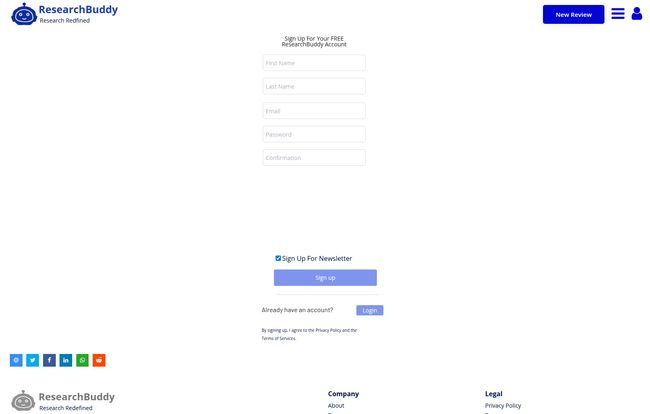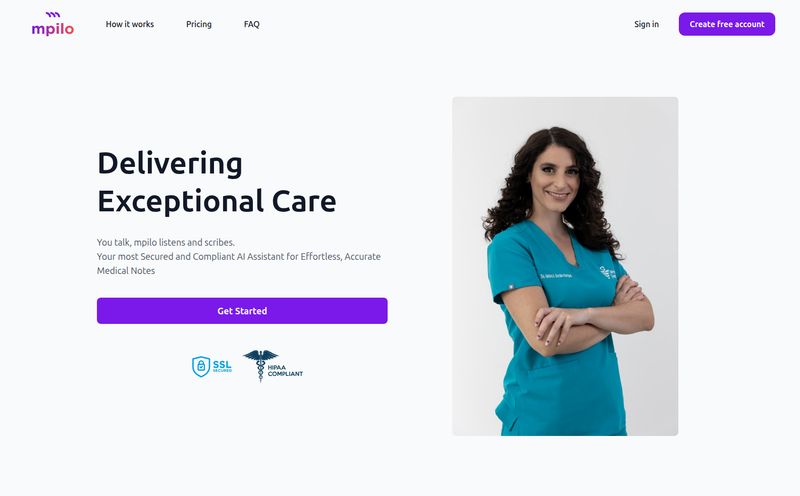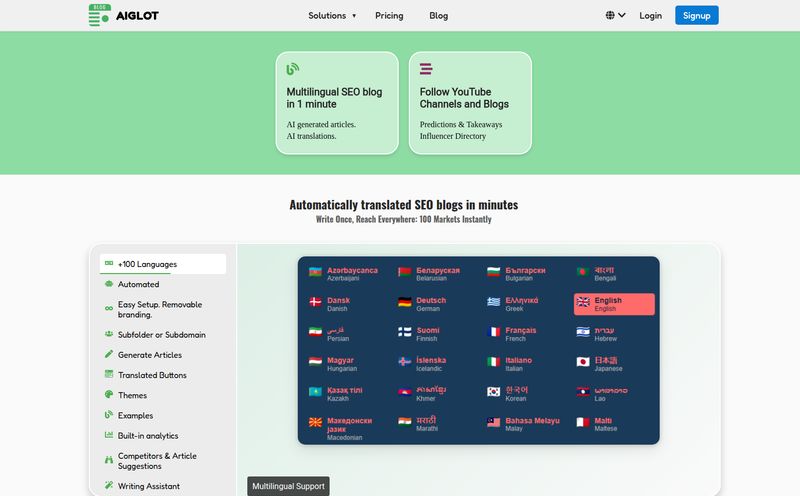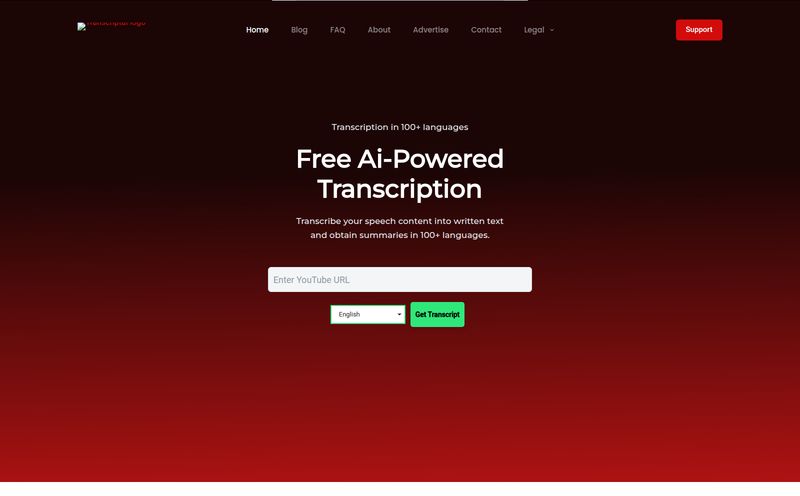The part of my job I love the most is strategy. The creative spark, the data deep-dive, figuring out that one perfect keyword that cracks a SERP wide open. The part I… tolerate? The endless, mind-numbing slog of initial research for a big pillar post. You know the drill. Dozens of tabs open, sifting through academic papers, competitor blogs, and forum threads, trying to piece together a coherent narrative. It can feel like trying to drink from a firehose, and honestly, some days it’s just a grind.
So, whenever a new tool pops up promising to automate or streamline this process, my ears perk up. I’m a sucker for anything that claims to give me back time. Enter ResearchBuddy, a new player on the scene with a pretty bold claim: it automates literature reviews and the creation of briefing papers. My immediate thought was, “Yeah, right.” My second thought was, “Okay, tell me more.”
So, What Exactly Is This ResearchBuddy Thing?
At its core, ResearchBuddy is designed to be your personal research grunt. Its whole purpose is to take on the heavy lifting of gathering and synthesizing information. Instead of you manually hunting down sources, reading through them, and pulling out the key points to build a literature review or a brief, the app is supposed to do it for you. It presents the relevant information automatically. In theory, this is the holy grail for academics, grad students, and frankly, content marketers and SEOs like me who need to build authority on a topic, fast.
The idea of feeding a topic into a machine and getting back a structured overview is… well, it’s pretty darn appealing. Think of all the hours saved. The tedious copy-pasting into a separate document, the trying to remember which of the 37 open tabs had that one killer statistic. ResearchBuddy aims to eliminate all that. It’s not just a search engine; it’s positioned as a synthesis engine. That’s a big difference.

Visit ResearchBuddy
The Big Promise: Giving You Back Your Time
Time is the one resource we can’t make more of, right? The main value proposition here is efficiency. I once spent the better part of a week building a comprehensive brief on the future of programmatic advertising. The research was intense, the sources were dense, and by the end, my brain felt like scrambled eggs. A tool that could have cut that time in half, or even by a quarter, would have been invaluable. That’s the dream ResearchBuddy is selling.
Cutting Through the Digital Noise
The platform claims it doesn't just fetch data, it presents relevant information. This is critical. Anyone can type a query into Google Scholar. The real skill, and the real-time sink, is weeding out the irrelevant, the outdated, and the low-quality sources. If ResearchBuddy’s AI is smart enough to act as a quality filter and a summarizer, it moves from a simple convenience to a genuine powerhouse. It’s like having a junior research assistant who never needs a coffee break and has read literally everything.
My First Impressions and a Few Question Marks
Okay, so I was intrigued enough to sign up. The landing page is clean, straightforward. You sign up for a “FREE ResearchBuddy Account.” And this is where my SEO-spider-sense started tingling. The word “FREE” is doing a lot of work there. Usually, when an account is just free, they just say “Create Account.” When it’s a “FREE Account,” it often implies the existence of a “PAID Account.” There’s no pricing page to be found, so the exact limitations of this free tier are a bit of a mystery. Is it a trial? A freemium model with limited reviews per month? We don’t know yet, and that lack of transparency is a small red flag for me.
A Glitch in the Matrix?
While exploring the site, I clicked a link and hit a “Oops! 404 error” page. It happens. No site is perfect. But the interesting part was the boilerplate text on the page, which mentioned “Bubble Pro” and a “boilerplate.” For the uninitiated, Bubble is a popular no-code platform for building web applications. This is actually a cool piece of intel. It tells me ResearchBuddy is likely a lean startup, possibly a solo founder or small team, building their product with agile tools. I respect that hustle! But it also suggests the product might still be in its early stages. So, users should probably expect a few rough edges and be patient as the platform matures. It’s not a polished product from a massive corporation, and thats ok, but its good to set expectations.
The extent of customization is another open question. Can I guide the AI? Point it toward certain sources or away from others? Can I define the tone or style of the review? These are the features that would separate a good tool from a great one, and the website doesn’t give us those details just yet.
Who is ResearchBuddy Really For?
The obvious answer is students and academics. Writing a dissertation or a thesis involves a monster of a literature review, and this could be a game-changer. But I think the audience is broader.
- Content Marketers & SEOs: Imagine you need to create a 5,000-word pillar page on a complex topic. You could use ResearchBuddy to generate a foundational brief, complete with key studies and talking points, in a fraction of the time. This helps build E-E-A-T (Experience, Expertise, Authoritativeness, and Trustworthiness) by grounding your content in solid research.
- Market Researchers & Analysts: Need to quickly get up to speed on a new industry or technology? A tool like this could produce an initial briefing paper to guide your deeper analysis.
- Journalists & Writers: When you're on a tight deadline, being able to automate the initial fact-finding phase could be the difference between making and missing a publication date.
Basically, anyone whose job involves the dreaded phrase, “Can you do some research on…” is a potential user. The tool’s success will hinge on how well it delivers on its promise of automation and relevance. A generic, poorly-sourced summary isn’t helpful. A well-structured, insightful review is a golden ticket.
My Final Take: Is ResearchBuddy Worth Your Time?
So, what’s the bottom line? I’m cautiously optimistic. ResearchBuddy is tackling a very real, very widespread pain point. The promise of automating the grunt work of research is incredibly compelling. If it can deliver even 70% of what it promises, it will be a valuable addition to many people’s toolkits.
Yes, there are question marks. The pricing model is unclear, and the platform seems to be in its very early days (shoutout to the Bubble users!). It might be a little buggy. But the potential is undeniable. We are in the age of AI assistants, and a specialized research assistant makes perfect sense. My advice? Go sign up for the free account. Kick the tires. See what it can do for you. It might have a few quirks, but it could also be the buddy that saves you from your next research-induced headache. In my book, that’s a risk worth taking.
Frequently Asked Questions about ResearchBuddy
- Is ResearchBuddy completely free to use?
- The website allows you to sign up for a "FREE ResearchBuddy Account," but the lack of a pricing page makes it unclear if this is a limited trial or a freemium plan. It's best to assume there may be paid tiers for full functionality.
- How does ResearchBuddy actually generate a literature review?
- While the exact mechanism isn't detailed, it's an AI-powered platform. It likely uses large language models (LLMs) and natural language processing (NLP) to search vast databases of academic papers and other sources, identify key themes and findings, and then synthesize them into a structured document.
- Can I use ResearchBuddy for SEO content creation?
- Absolutely. One of the best potential uses is to quickly generate research briefs for long-form articles or pillar pages. This can help you create more authoritative, well-sourced content that search engines like Google tend to favor, boosting your site's E-E-A-T signals.
- Is ResearchBuddy suitable for serious academic research?
- It could be a fantastic starting point. It can help you map out the existing literature and identify key papers. However, for a PhD or serious academic publication, you would still need to critically evaluate, read the primary sources yourself, and add your own unique analysis. Think of it as an accelerator, not a replacement for scholarly work.
- What is a literature review anyway?
- A literature review is a comprehensive summary of previous research on a topic. It surveys scholarly articles, books, and other sources relevant to a particular issue, providing a description, summary, and critical evaluation of each work. Its purpose is to give the reader a clear overview of the current state of knowledge on the subject.
- Where can I find ResearchBuddy on other platforms?
- Based on their website, ResearchBuddy has a presence on Product Hunt, which is a great place to see early user feedback and reviews from the tech community.
Reference and Sources
- Official Website: ResearchBuddy.app
- Platform Builder: Bubble.io
- Product Hunt Listing: ResearchBuddy on Product Hunt (Note: This is a speculative link based on the icon, the actual URL may differ).



